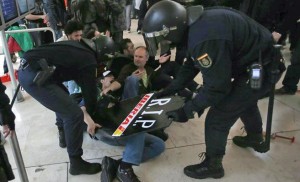
Striking Iberia workers this week held up banners saying their airline is not for sale – they believe the restructuring plan put forward by parent company International Airlines Group (IAG) is not really about restructuring at all but about letting British Airways, Iberia’s partner under the IAG umbrella, acquire the Spanish airline’s assets at knock-down prices.
The prices, though, would not in fact be knock-down, because Iberia has continued to haemorrhage money since its merger with BA at the start of 2011. It lost a cool €262 million in the first nine months of last year.
In their campaign against the 3,800 redundancies, 15-percent route reduction and across-the-board pay cuts demanded by IAG, the Iberia unions have proposed an alternative strategy. They want the company to compete more aggressively rather than simply shrinking its operations.
The unions contend that Iberia can grow back into profit. IAG insists that the fastest way to solvency is to cut costs.
Which is a nice mirror image of the broader debate on how to get Spain out of recession.
Another (and rather more exotic) mirror image connects the police incursion into Terminal 4 at Barajas Airport to remove Iberia strikers, and the police incursion, in La Paz and other cities, into the offices of Sabsa, the Spanish-owned company that operates airports in Bolivia.
Bolivian police acted following a decree by President Evo Morales nationalising the airports of La Paz, Santa Cruz (the country’s second city) and Cochabamba (its fourth city) and cancelling the lucrative Sabsa management contract that still had another 12 years to run.
Mr Morales accused the management company of “maximising profits” at the expense of Bolivia.
It’s unlikely that Sabsa, a joint venture between Abertis of Barcelona (which is also involved in running Cardiff, Belfast and Luton airports) and AENA, the publicly owned Spanish airport authority (and the largest airport management company in the world) would deny maximising profit – that is no doubt precisely why they are in business. Nor is it unreasonable for President Morales to argue that public interest trumps private profit, since the Bolivian constitution apparently makes exactly this stipulation in the case of strategic industries.
The government in Madrid has vigorously protested the nationalisation, its indignation perhaps understandable since President Morales nationalised two other Spanish companies last year on similar grounds.
Condemned at home for not making enough profit, condemned abroad for making too much – Spanish firms just can’t catch a break.
Can’t lend, won’t lend
Iberia’s losses in the first nine months of 2012 exceed by €5 million the losses clocked up in the same period by real estate giant Reyal Urbis, which declared bankruptcy this week with debts of €3.6 billion, the second-biggest bankruptcy in Spanish corporate history and an event that will have unpleasant ramifications for Spanish and European banks.
The company could still reach a debt restructuring agreement with its creditors, but this is tricky because the banks, as we know, are more interested at the moment in calling in loans than extending them.
The institutional disinclination to take a flutter on anything risky (something, of course, that wasn’t a problem for more than a decade) extends beyond struggling real estate giants to small and medium-sized start-ups that are generally regarded as the key to reversing the spectacular rise in unemployment.
This week, Spanish banks were reported to be seeking additional government incentives before they will start lending again, which is a fairly breathtaking example of chutzpah from an industry that has accepted billions of euros worth of publicly funded emergency credit.
And the winner isn’t . . .
Sometimes, though, you need a spot of chutzpah to weather embarrassing mistakes. A particularly embarrassing mistake occurred at last weekend’s Goya Awards in Madrid, when one of the presenters read out the wrong name and then after several seconds read out the right one – prompting two sets of filmmakers to approach the stage in the happy expectation that they were about to collect the little bust of the celebrated artist and accept the approbation of their peers.
Universal cringe.
Still, the rightful winners were gracious towards the wrongly-attributed ones, and the incident was handled with some delicacy by all concerned.
Not much of that in the world of industrial relations and profit maximisation, alas.
To read more by Anna Maria O’Donovan visit My Spanish Interlude.
Leave a Reply
You must be logged in to post a comment.